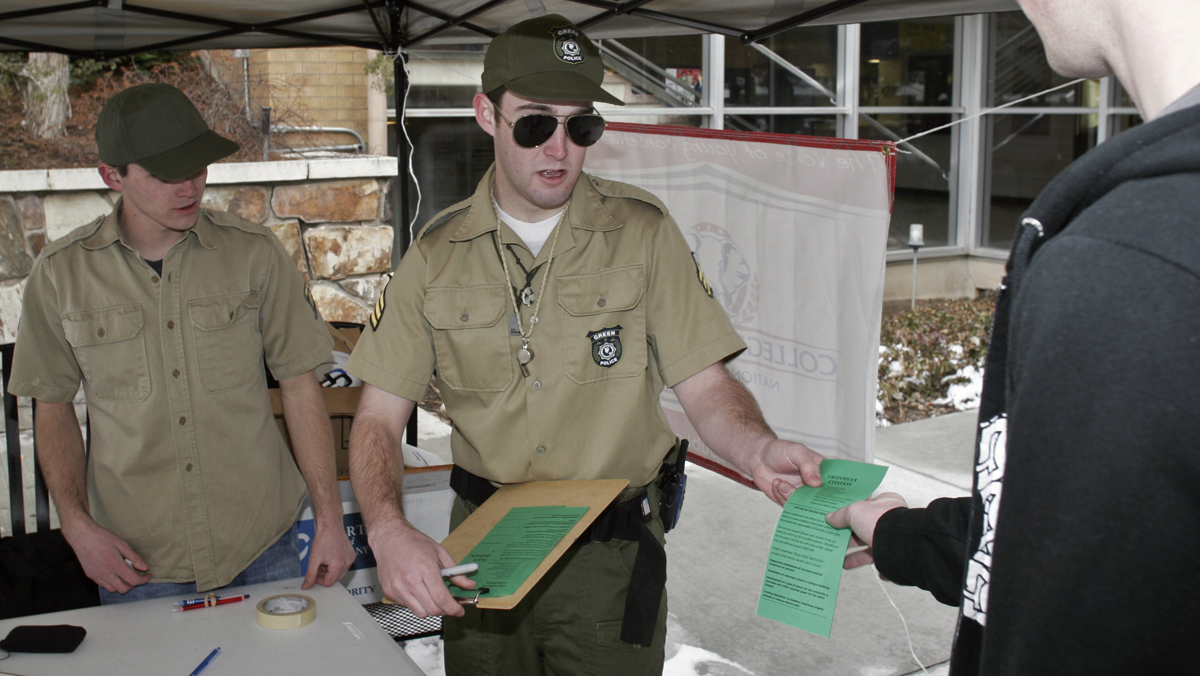Students protest new ‘green’ fee
In opposition to the Blue Goes Green fee that will go before students on the final elections’ ballot, the College Republicans set up on the TSC patio to protest the implementation of this up to $3 fee.
“They will take in $450,000 in the next five years. To save the university money they would have to create projects that would reduce energy use or water use by more than a half-million dollars,” said Terry Camp, College Republicans chairman.
Camp, along with other College Republican members, dressed as “Green Police” in a satirical protest against the Blue Goes Green fee, which consisted partly of ordering passing students to recycle.
USU’s sustainability council proposed students pay 25 cents per credit hour to support a fund that aims to create sustainable projects and sustainability-geared internships and jobs. Ben Berrett, director of planning design and construction and said USU Facilities is open to student-lead projects that will benefit energy conservation, and said he is unaware of any negative feelings toward the fee from the Facilities side.
“I think having student support and input is a great thing, and we’ve had quite a few students in the last year who have attended our energy conservation subcommittee,” Berrett said. “I think this is going in the right direction.”
Bill Sproat, a student who has been actively campaigning against the Blue Goes Green fee, like Camp, said he would be more in favor of the fee if it was not continually implemented for five years. He said he fully supports “going green,” but would like to see the fee voted on again if it is passed, in order to ensure students see the benefits coming from it. The Sustainability Council’s Blue Goes Green fee proposal states they will instead undergo a self-evaluation. He said he believes this process is not efficient.
“Give me a self-evaluation and I’ll think I’m freaking cool. Give me a self-evaluation in five years and I’ll still think I’m freaking cool,” Sproat said.
Student Services Vice President James Morales said he supports the Blue Goes Green fee, because he has seen the good that can come from the establishment of green initiatives. Before working at USU, Morales was employed with University of Minnesota-Morris, which was successful in saving money and the environment through wind turbines, “robust” recycling initiatives and local food sold on campus.
“If you don’t make the investments now you aren’t going to reach the point where it is going to pay off later,” Morales said. “In the short term, we become more aware of the impact we have on our environment on each other. In the long term there are paybacks financially.”
He said the success of the fee will require some entrepreneurial skill from the students as well as experimentation in order to develop.
Students should work more with Facilities to create energy efficiency, Camp said, rather than ask students for money. The Blue Goes Green fee is similar to the Athletics fee, because it benefits one group of students while all others are required to pay the set amount, Camp said. Instead of asking for $3, the Sustainability Council could ask for less, because individually it may not seem like a large amount, he said, but collectively, it’s a large sum of money.
“If it’s so great, then students should be able to donate to fund it,” Camp said.
Sustainability council member Blake Thomas said fundraising would not be efficient in supporting their green initiatives.
“Fundraising isn’t going to consistently raise enough money to support the internships and projects,” Thomas said. “In my opinion it wouldn’t be consistent enough or make enough.
Thomas said if the fee is passed and students bring sustainable projects they would like to pursue to the sustainability council, they will not necessarily be approved. He said the projects will be approved or disapproved after discussion based on their promise in improving USU conservation.
Camp said he worries the Student Sustainability Council members are trying to pass the fee so they have one more thing to add to their resume.
“There are benefits that aren’t tangible with this fee. The warm fuzzy benefits,” Camp said. “You can’t always just fund intangible projects just because they make you feel better. Those can be important but I don’t believe a mandatory fee is necessary to create those warm fuzzy feelings.”
– catherine.meidell@aggiemail.usu.edu

